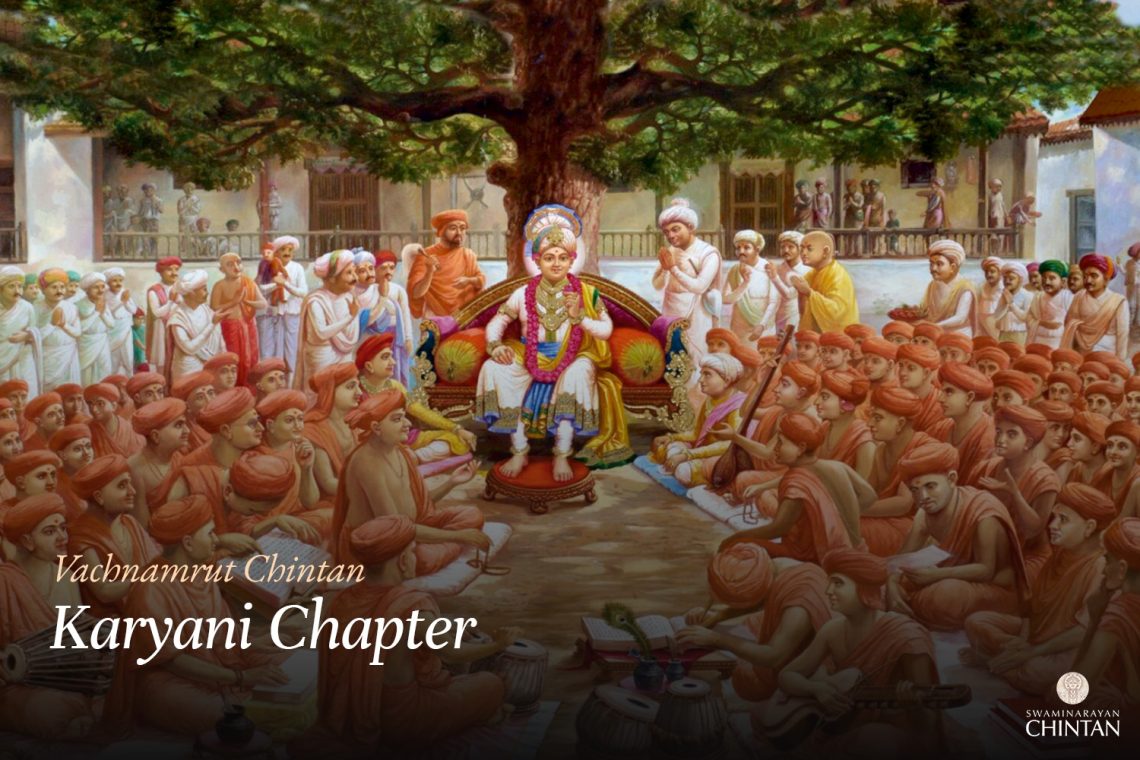Central Insights:
- The purpose of Bhagwan’s incarnation.
Main Points:
- The main purpose of His incarnation is to lovingly nurture His ekantik bhaktas.
- The purpose also includes the establishment of Dharma and the destruction of the asuras.
Commentary:
In this Vachanamrut, Shreeji Maharaj asked the Santo a question: Bhagwan incarnates on Earth for the salvation of the Jeev, but is He not capable of doing so while residing in His own Dham without taking an incarnation? After all, Bhagwan can liberate the Jeev in whichever way He chooses, so what is the purpose of His incarnation? If He can only liberate by incarnating, and not while remaining in His Dham, does that imply a limitation in Bhagwan’s abilities? Bhagwan, after all, can liberate the Jeev whether He incarnates or not. So, what is the purpose of Bhagwan’s incarnation? This was the question. In other words, is there a greater purpose beyond just the liberation of the Jeev? The Santo were unable to provide a satisfactory answer.
At that point, Shreeji Maharaj responded: The primary purpose of Bhagwan’s incarnation is to lovingly indulge His ekantik bhaktas who possess immense love for Him. This can only be achieved when He personally incarnates. It cannot be accomplished by any other means. Therefore, Bhagwan must incarnate to personally nurture His uniquely devoted ekantik bhaktas.
In the Gita, Bhagwan writes about the purpose of His incarnation:
यदा यदा हि धर्मस्य ग्लानिर्भवति भारत ।
अभ्युत्थानमधर्मस्य तदात्मानं सृजाम्यहम्।।
परित्राणाय साधूनां विनाशाय च दुष्कृताम्।
धर्मसंस्थापनार्थाय सम्भवामि युगे युगे।।
yadā yadā hi dharmasya glānir bhavati bhārata |
abhyutthānam adharmasya tadātmānaṁ sṛjāmy aham ||
paritrāṇāya sādhūnāṁ vināśāya ca duṣkṛtām |
dharma-saṁsthāpanārthāya sambhavāmi yuge yuge |
(Gita: 4.7-8)
In this, Bhagwan first indicates the time when He incarnates, saying, “Yadā yadā hi…” When such circumstances arise, I incarnate. Then, He explains the purpose of His incarnation in the next verse: to protect the sadhus (saints), to destroy the wicked, and to establish Dharma. Among these, protecting the sadhus is His primary purpose; the rest are secondary.
Now, one might ask, what does it mean to protect the sadhus? The true sadhus do not desire bodily protection from Bhagwan. For instance, Prahladji told Narasinha Bhagwan, “I do not consider the protection of my body as true protection. When you protect me from my inner enemies and the urges of my senses, only then do I consider it true protection.” Therefore, true sadhus do not even recognize the sufferings inflicted upon them by evil persons. So, why does Bhagwan need to protect His sadhus?
The solution, as explained by the Acharyas, is that ekantik bhaktas who have unwavering love for Bhagwan suffer a pain far greater than any inflicted by evil beings—the pain of separation from Bhagwan. Their very life breath is tormented by this separation, and they are unable to bear it. To alleviate this pain, Bhagwan is compelled to incarnate. By incarnating, He offers the proximity of His murti (form) and lovingly nurtures these devotees, relieving their suffering.
Shreeji Maharaj explains that these devotees are bound by their physical bodies and are influenced by gross emotions. Therefore, Bhagwan conceals His divinity and aishwarya (superhuman powers) and takes on a human form similar to theirs. He becomes like them, a being with a physical body, and lovingly indulges them. When Bhagwan takes on a form like theirs, the devotees experience the true bliss of His murti. They relate to Him as a friend, a companion, or a relative. The relationship becomes more intimate, and formalities fade away. Bhagwan lovingly fulfills their desires, as they wish. Thus, the primary purpose of Bhagwan’s incarnation is to fulfill the desires of His truly loving devotees and to make them happy. While incarnating on Earth, Bhagwan simultaneously liberates innumerable Jeev, establishes Dharma, and destroys the asuras who create obstacles. However, these are secondary purposes, which Bhagwan can achieve through other means. The primary purpose, which cannot be fulfilled by anyone else, is lovingly indulging His bhaktas.
Glossary
| Bhagwan’s Incarnation – When Bhagwan takes a human form to fulfill the desires of His devotees. |
| Ekantik Bhakta – Single-minded devotee A devotee imbued with Dharma, Gyan, Vairagya, and Bhakti, fully dedicated to God. |
| Dham – Divine abode of God |
| Murti – Divine form of God Refers to Bhagwan’s physical or imagined divine form, which provides joy and spiritual connection during contemplation. |
| Dharma – Righteousness |
| Asura – Wicked beings |
| Paritrāṇāya Sādhūnām – Protection of saints |
| Aishwarya – Divine powers |
| Gross Emotions – Material- bound feelings |
| Acharyas – Spiritual Leaders of Sampraday |
| Spiritual Protection – Safeguarding from inner enemies |

